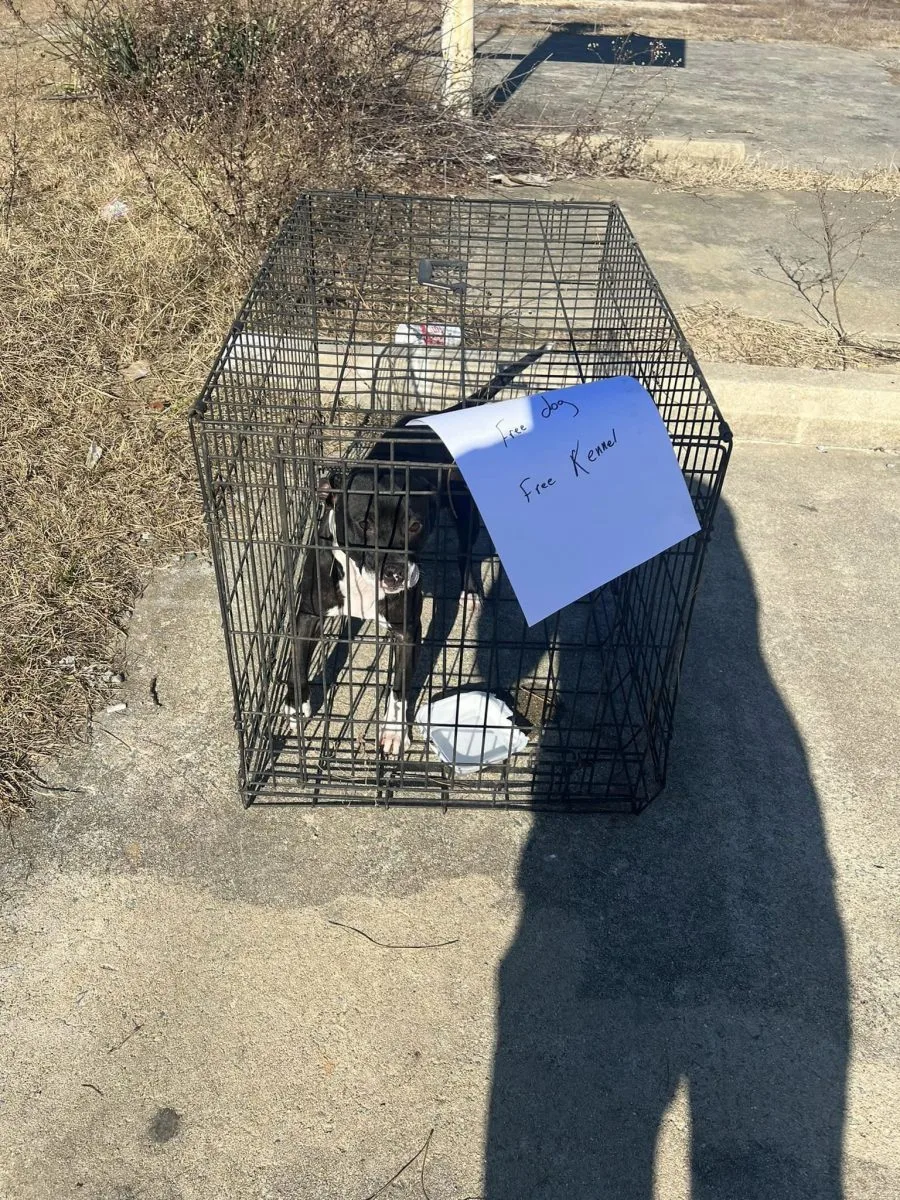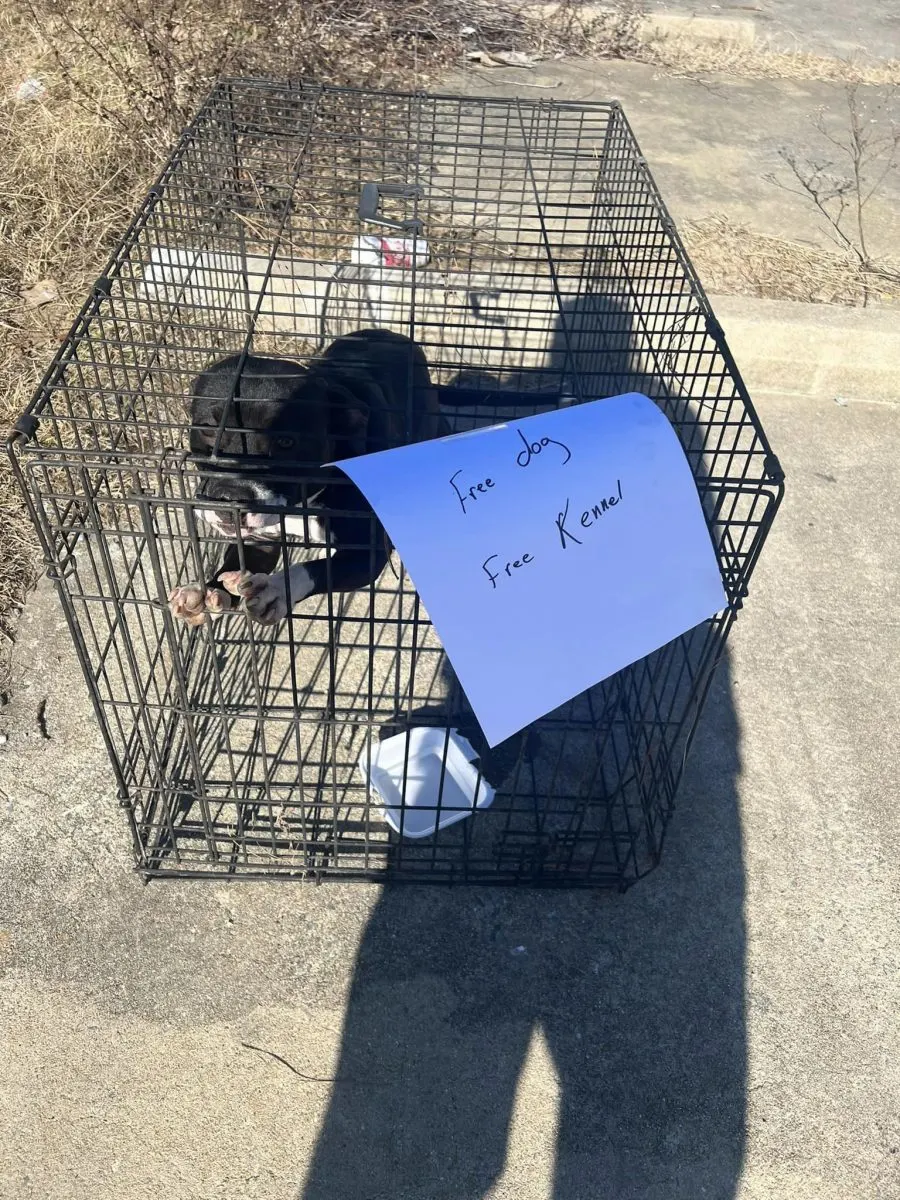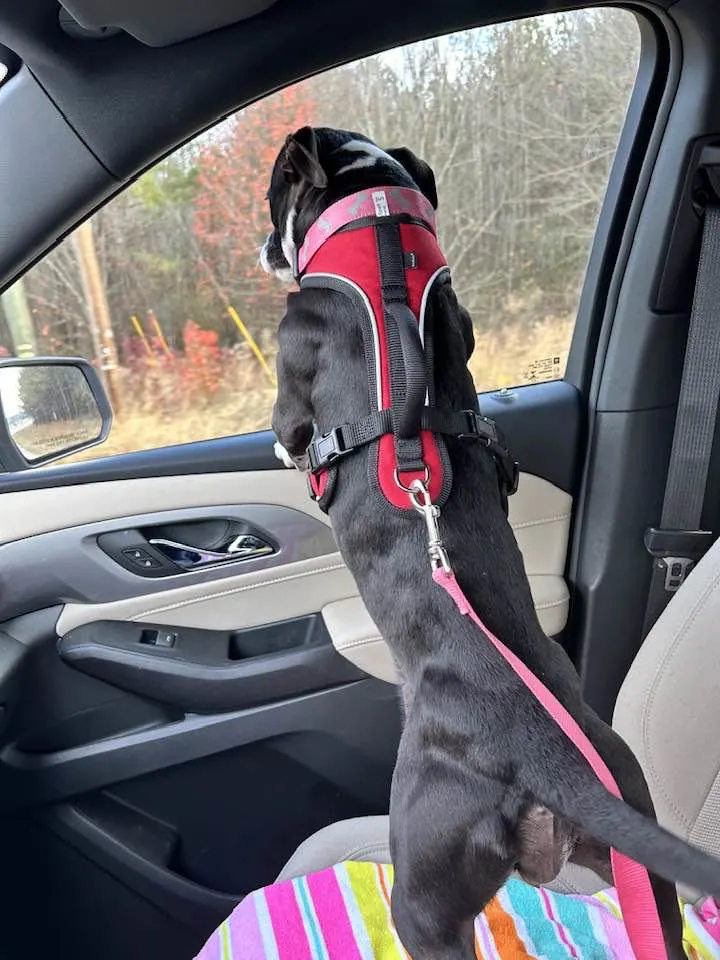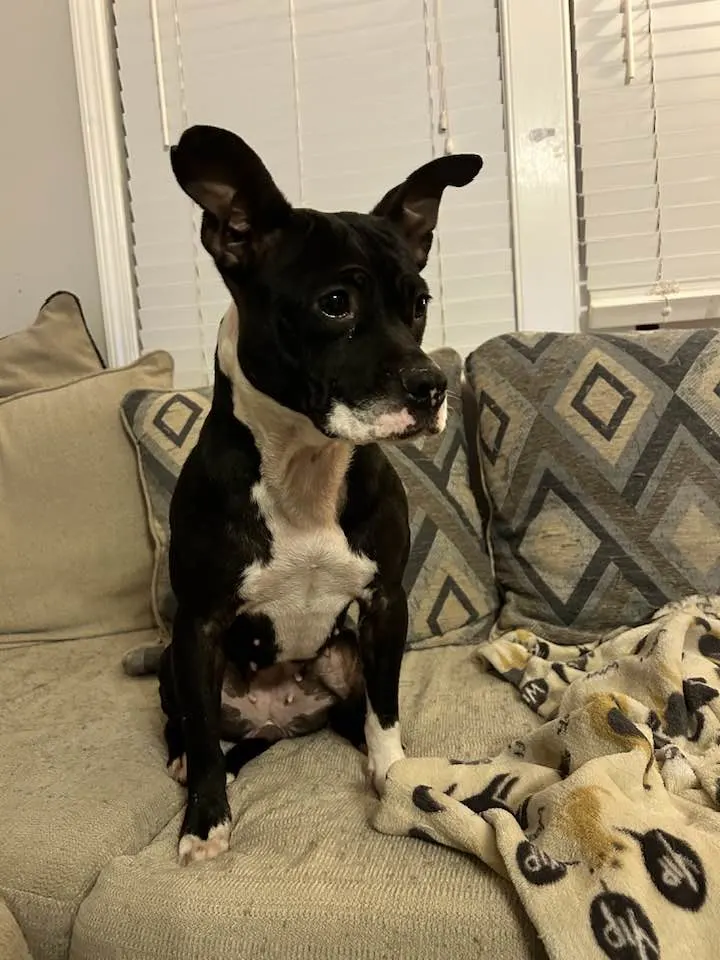Trust is a very important virtue that humans place a lot of meaning in. It’s what defines our relationships and makes them last long.
However, some people only apply this to themselves and not to animals, as more often than not, people will abandon their dogs who trust them completely and leave them on the street.
When that trust is shattered, it’s hard for them to recover from the mental trauma and learn how to believe in someone again.
In this story, we will talk about a sweet dog who was abandoned in a kennel in the middle of a highway.
A Heartbreaking Story

Nova is a very special dog. And, even though she had a rough start, she had hoped for a normal life, but was abandoned by her owner on the road with a ‘free’ sign on her kennel.
It’s absolutely tragic that somebody would do this to a dog, and to make matters worse, it happened on a very busy highway.
Luckily, for Nova, one person noticed her and couldn’t just stand back and do nothing. The Good Samaritan posted about her online in hopes that a rescue organization would come and help.

Surprisingly, Madison Nygard, a volunteer for the organization, Pawfect Match Rescue, in North Carolina, answered the call.
She told People: “I was on my way. I had seen it a couple of minutes after it had posted it. I got to Nova before the post hit the hour mark.“
After she arrived at the scene, she was horrified to see the sign on the kennel and wondered who could have done this.
Nova’s New Chapter

She had a little discussion with animal control officers who were there with her, but ultimately, she decided that she was going to help Nova by rescuing her.
Nygard took her to a veterinarian clinic in North Carolina where she could get a checkup and treatment in case she was sick.
She said: “I knew that at least if I brought her into the house, she would have food in her belly, and I could physically monitor.”
Now that she was in Nygard’s foster care, she could finally relax and just enjoy herself a little bit, and it’s safe to say that she took every opportunity she could to show her gratitude.

She got along well with everybody in the house, and Nygard was happy to see her make such progress after going through so much.
While she loved being with them, her foster mom still had to find a more permanent home for her, and she found a few potential adopters.
However, it’ll be a while before the process is complete. Until then, she gets to enjoy being in a warm home with lots of treats, toys, and a family who will care for her.
Ever noticed your furry friend munching on grass like it’s the latest delicacy? It’s a common sight that often leaves pet owners puzzled. You’re not alone in wondering why your dog has a sudden craving for greens. Dogs eating grass is a behavior that has intrigued many pet parents over the years. As a seasoned dog trainer, you’ve probably come across this curious habit more times than you can count.
When your canine companion starts nibbling on grass, it’s easy to jump to conclusions. But before you assume it’s just a random quirk, there might be more to it than meets the eye. Understanding the reasons behind this behavior can shed light on your dog’s health and well-being. So, next time you catch your pup grazing in the backyard, remember, there’s often a deeper story behind their leafy snack choice.
Understanding the Behavior of Eating Grass in Dogs
Wondering why your furry friend nibbles on grass? Here’s what might be going on:
1. Natural Instincts
Dogs are descendants of wolves, who occasionally consume vegetation in the wild. It’s possible that your pup is showing remnants of this natural behavior.
2. Stomach Upset
If your dog’s tummy feels a bit off, they may turn to grass to help alleviate their discomfort. The grass can induce vomiting, providing relief.
3. Nutritional Deficiency
In some cases, dogs may eat grass to fulfill a nutritional gap in their diet. Ensure they’re getting a balanced diet to curb this behavior.
4. Boredom or Anxiety
Just like humans, dogs can get bored or anxious. Chewing on grass might be their way of relieving stress or passing the time.
5. Seeking Attention
Your dog may have learned that eating grass grabs your focus. It could be their way of seeking attention from you.
6. Exploration and Taste
For some dogs, the act of trying new things and exploring their environment includes tasting different textures, like grass.
Understanding why your dog snacks on grass can help you address any underlying issues or simply accept it as a quirky part of their personality.
Health Considerations Related to Dogs Eating Grass
Nutritional Deficiencies
If your dog eats grass regularly, it might signal nutritional deficiencies. Dogs sometimes resort to grass consumption to supplement their diets with fiber, minerals, or other nutrients lacking in their regular meals. Ensuring your dog’s diet is well-balanced and nutritionally complete can help curb this behavior.
Digestive Issues
Eating grass could indicate digestive problems, such as an upset stomach or gastrointestinal discomfort. Dogs may instinctively consume grass to induce vomiting and alleviate stomach issues. If this behavior is persistent or accompanied by other concerning symptoms, consult your vet to rule out any underlying health issues.
Behavioral Concerns
In some cases, dogs may eat grass out of boredom, anxiety, or simply as a way to seek attention. Addressing your dog’s physical exercise, mental stimulation, and emotional well-being can help minimize grass-eating behaviors stemming from psychological factors.
Pesticide Exposure
If your dog ingests grass from areas treated with pesticides or herbicides, it can pose health risks. These chemicals can be toxic to dogs and lead to various health complications. Ensure your dog’s access to grass is limited to safe, untreated areas to prevent pesticide poisoning.
Potential Risks
While occasional grass consumption may not harm your dog, regularly eating large amounts could lead to intestinal blockages or irritation. Monitor your dog’s grass-eating habits and consult your vet if it becomes excessive or if you notice any adverse effects on their health.
Remember, understanding the reasons behind your dog’s grass-eating behavior can help you address any underlying issues and ensure your furry companion stays healthy and happy.
Behavioral Approaches to Manage Grass Eating
When trying to curb your dog’s grass-eating behavior, consider the following approaches:
Weight Management:
Keeping your dog at a healthy weight can reduce the likelihood of them seeking out grass for digestive aid. Ensure they are on a balanced diet and engage in regular exercise to maintain their ideal weight.
Enrichment Activities:
Enhance your dog’s environment with stimulating toys and activities to prevent boredom, a common trigger for grass consumption. Interactive games and regular playtime can keep them mentally engaged and less likely to nibble on grass.
Training and Distraction Techniques:
Training your dog with commands like “leave it” or “drop it” can redirect their focus away from eating grass. Offering alternative chew toys or treats can also help distract them from the habit.
Consultation with a Professional:
If your dog’s grass-eating persists despite your efforts, consult with a veterinarian or a professional dog behaviorist. They can provide tailored advice and intervention strategies to address the underlying causes of the behavior.
Environmental Management:
Limit your dog’s access to areas with treated or potentially harmful grass. Opt for pet-friendly landscaping options and regularly monitor the areas where your dog roams to ensure their safety.
By implementing these behavioral approaches, you can effectively manage your dog’s grass-eating habit and promote their overall well-being. Remember, understanding the reasons behind this behavior and taking proactive steps is key to supporting your furry companion’s health.
Dietary and Nutritional Factors Impacting Grass Consumption
When it comes to why dogs eat grass, dietary and nutritional factors play a significant role. Here’s how these factors can influence your dog’s grass-eating behavior:
Inadequate Diet
If your dog isn’t getting all the necessary nutrients from their food, they might seek out grass to supplement their diet. Ensure your dog’s food is balanced and meets their nutritional needs to reduce their grass consumption.
Fiber Intake
Sometimes, dogs eat grass to aid digestion or to add more fiber to their diet. Consider adding fiber-rich foods to their meals or switching to a dog food with higher fiber content to address this behavior.
Upset Stomach
When your dog has an upset stomach, they may eat grass to induce vomiting and alleviate discomfort. Monitor your dog’s digestive health and consult your vet if they frequently show signs of stomach issues.
Behavioral Responses
In some cases, grass consumption can be a behavioral response to stress, anxiety, or boredom. Engage your dog in activities to keep them mentally stimulated and address any underlying anxieties they may have.
Veterinary Evaluation
If your dog’s grass-eating habits persist despite dietary changes, consult your vet. They can assess your dog’s overall health and provide specific recommendations tailored to your furry companion’s needs.
Understanding how dietary and nutritional factors impact your dog’s grass consumption is key to addressing this behavior and ensuring your pet’s well-being. By taking proactive steps and seeking professional guidance, you can help your dog lead a happier and healthier life.
Conclusion
So, there you have it! Your furry friend munching on grass could be due to various reasons like instincts, diet, or just plain old boredom. Remember, keeping an eye on what they eat, providing a balanced diet, and seeking advice from your vet are key. By adjusting their food, keeping them active, and ensuring their tummy is happy, you can help curb their grass-eating habits. Understanding these factors will not only help manage their behavior but also keep them healthy and happy. So, next time you catch your dog grazing in the backyard, you’ll know just what to do.
Frequently Asked Questions
Why do dogs eat grass?
Dogs may eat grass due to natural instincts, nutritional deficiencies, or behavioral triggers. It can help with digestion or relieve an upset stomach.
How can I stop my dog from eating grass?
To prevent grass consumption, ensure your dog has a balanced diet, try adding fiber-rich foods, address any digestive issues, keep them engaged with activities, and consult a vet if the behavior persists.
Is it harmful for dogs to eat grass?
Eating grass is usually not harmful, but it can lead to digestive issues or pesticide exposure if grass is treated with chemicals. Monitor your dog’s grass consumption for any potential problems.
When should I be concerned about my dog eating grass?
If your dog excessively eats grass, vomits after consuming it, exhibits signs of illness, or the behavior suddenly changes, consult a veterinarian for further evaluation.
[no_toc]

Hey there, I’m Janet Brooks, a dog-loving student from California. I’m all about helping pups in need, especially those without homes. Me and my awesome friends work together to give shelter and love to stray dogs. Oh, and I also write blogs about dogs to share helpful info.